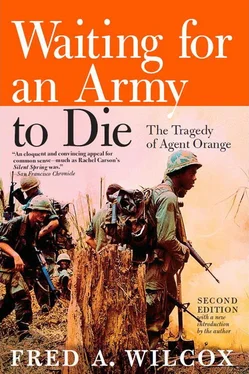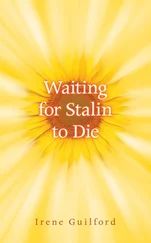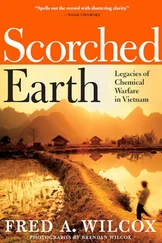Like their American counterparts in Vietnam, Australian soldiers had been told very little, if anything, about the health effects of long-term exposure to herbicides. According to an Australian army handout, “Instructions for Spraying Herbicides,” the spray was not “toxic to humans when dispersed as a spray on vegetation,” but “casualties can be caused by spillage of the chemical concentrates on the skin and clothes by the spray. Therefore protective clothing and equipment is worn, and simple safety precautions are to be followed.” Side effects from weedicides and soil sterilants are:
a. Blistering of the skin.
b. Toenails dropping off.
c. Systematic poisoning with fatal results from continued absorption, inhalation, or swallowing of the spray or any of the concentrates.
d. Breakdown of mucous membrane, e.g., nosebleeds, red eyes, mouth ulceration.
But Graham Bell, Queensland president of the Vietnam Veterans Action Association recalls that members of his unit were told that they had absolutely nothing to worry about. “In my unit we were told the chemicals were harmless to humans and animals, that they did no permanent damage to the environment, and that the major disadvantage was that when regrowth occurred (a few weeks after spraying) it would be much more vigorous—just like giving the vegetation a burst of fertilizer. Troops of another unit, 5 R.A.R., were drenched with chemicals sprayed by American aircraft; they were told, ‘It won’t even hurt dumb animals.’” 1
Had Australian military personnel in charge of defoliation efforts consulted the US Army on herbicides on human health, they would have read that Agent Orange was “relatively nontoxic to man and animals. No injuries have been reported to personnel exposed to aircraft spray. Personnel subject to splashes from handling the agent need not be alarmed, but should shower and change clothes at a convenient opportunity.”
According to the American manual Agent Blue was also “relatively” harmless. “Normal sanitary conditions should be followed when handling Blue. Although it contains a form of arsenic, Blue is relatively nontoxic. It should not be taken internally, however. Any material that gets on the hands, face, or other parts of the body should be washed off at the first opportunity. Clothes that become wet with a solution of Blue should be washed afterwards…”
Neither the American nor the Australian military explain how grunts in the field might be able to shower or change their clothes immediately after exposure to toxic chemicals, or avoid eating food or drinking water contaminated with arsenic [6] By the war’s end, Operation Ranch Hand had sprayed 1,933,699 pounds of arsenic on the Vietnamese countryside.
or dioxin.
Shortly after he was assigned to spray herbicides, Gibson, his face covered with a burning rash, entered Nui Dat hospital complaining of severe gastroenteritis (an inflammation of the stomach and intestines) and suffering from high temperatures. The doctors who examined him were bewildered, concluding, just as American doctors examining personnel with similar symptoms in other regions of Vietnam did, that their patient was suffering from overexposure to the heat. Entering the hospital for a second time, Gibson was transferred to Vung Tau, where he was examined by nine doctors, all of whom seemed mystified by his symptoms.
“I was really concerned because I just couldn’t walk. The whole of my body, all over my groin and everywhere, was covered with a rash. But it was weeping and everything was just short of falling off. And I said to these guys, ‘What the bloody hell have I got?’ And they said, ‘Don’t worry, don’t worry, we think we know what it is. We think we can …’ But I says, ‘Yeah, you think you can what?’ And they said, ‘Oh, just take it easy, mate, we can fix you up.’ But hell, when you’ve got nine doctors looking at you and they don’t know, and when they come back with some younger doctors and start pointin’ and lookin’, it makes you a little bit worried. And still to this day the VA isn’t able to tell me what is was, or is.”
Draining his glass, Wares grimaces and with mincing sarcasm announces, “Why, it was the heat , mate, don’t you know that? The heat of course. We accepted that explanation at the time because that was all they ever told us, all we ever heard. It’s the tropics, boys, that’s what it is. And that, we now know, is just so much bullshit . Because people here in Queensland live in the tropics, and do they all run around with bloody skin diseases? We accepted the explanation at the time that our rashes were due to the heat, but we don’t believe a bloody word of it anymore. And I can tell you this. Never, never did they tell us anything about herbicide spraying, or about putting on any extra clothing or taking precautions against the spray. In fact at the time I wouldn’t have known what the word ‘defoliant’ meant, and that’s a fact, mate. I just wouldn’t have known. Bob Gibson of course knew something more because he actually sprayed, but the average serviceman, the average Australian, wouldn’t have had a clue.”
Gibson nods his head in sad agreement. Since his return from Phuoc Tuy Province he has suffered from skin rashes, insomnia, violent rages, and other problems symptomatic of dioxin exposure. His ability to work impaired by physical and emotional conditions for which he could find no cure, Gibson applied to the Australian Repatriation Commission for disability payments. But the commission, using language that might easily have been excerpted from an American VA form letter, rejected his request. About Gibson the commission’s psychiatrist wrote: “In this particular case, the patient is a thirty-two-year-old man who has a mild anxiety state. He sets himself up as a martyr and has suffered basically at his own hand by not allowing the memories of Vietnam and their associated emotions to fade with time. His present condition is due to his basic inherited personality pattern and his wish for martyrdom.”
During the twelve months he spent in Vietnam, Gibson had gone on numerous ambushes and had fought in a fierce two-day battle with North Vietnamese regulars in which the Australians were outnumbered and nearly destroyed. His unit’s motor positions wiped out, ammunition running low, and the NVA preparing for a final assault, Gibson had given up all hope of surviving the battle when American helicopter gunships arrived. Before the “Puffs” [7] Puff the Magic Dragon: C-47 cargo plane equipped with three electric-powered Gatling machine guns.
appeared, says Gibson, he had concluded that “we were all dead men.” In its initial rejection of his request for disability, the commission informed Gibson that he had spent very little time in combat; therefore, wrote the commission’s psychiatrist, “Vietnam could not really have been as traumatic as he now tells.” But later the commission reversed itself, acknowledging that Gibson was indeed a combat veteran while continuing to argue that his experiences in Vietnam were not responsible for his “anxiety condition.”
In retrospect Gibson says that he and the nineteen-year-olds with whom he served may have placed too much trust in people who either did not know or did not care what the effects of toxic chemicals might be on Australian soldiers. “As infantry soldiers we thought we knew what the hell we were doing, but really we were so naïve. We never thought that our government or our own military commanders would allow the use of anything that might have adverse effects on us as troops. And we used to walk through plantations of rotten banana trees that were just burstin’ at the bottom, you know, rottin’, stinkin’, with these tiny dwarf bananas on them. So we’d just walk through and pick them. They were sweet as hell, and we used to eat them all the time. No one ever told us not to. And the water, we used to get it out of streams and drink it. And one time I can really recall quite well. We went through this thick foliage, and it had all this sticky shiny stuff on it, and it stunk, I mean it really stunk. And we were going through this stuff and there was no two ways about it, it had been defoliated. And yet no one ever gave it one second thought that we were there, touching the stuff, getting it on our arms and face. No one thought.”
Читать дальше











